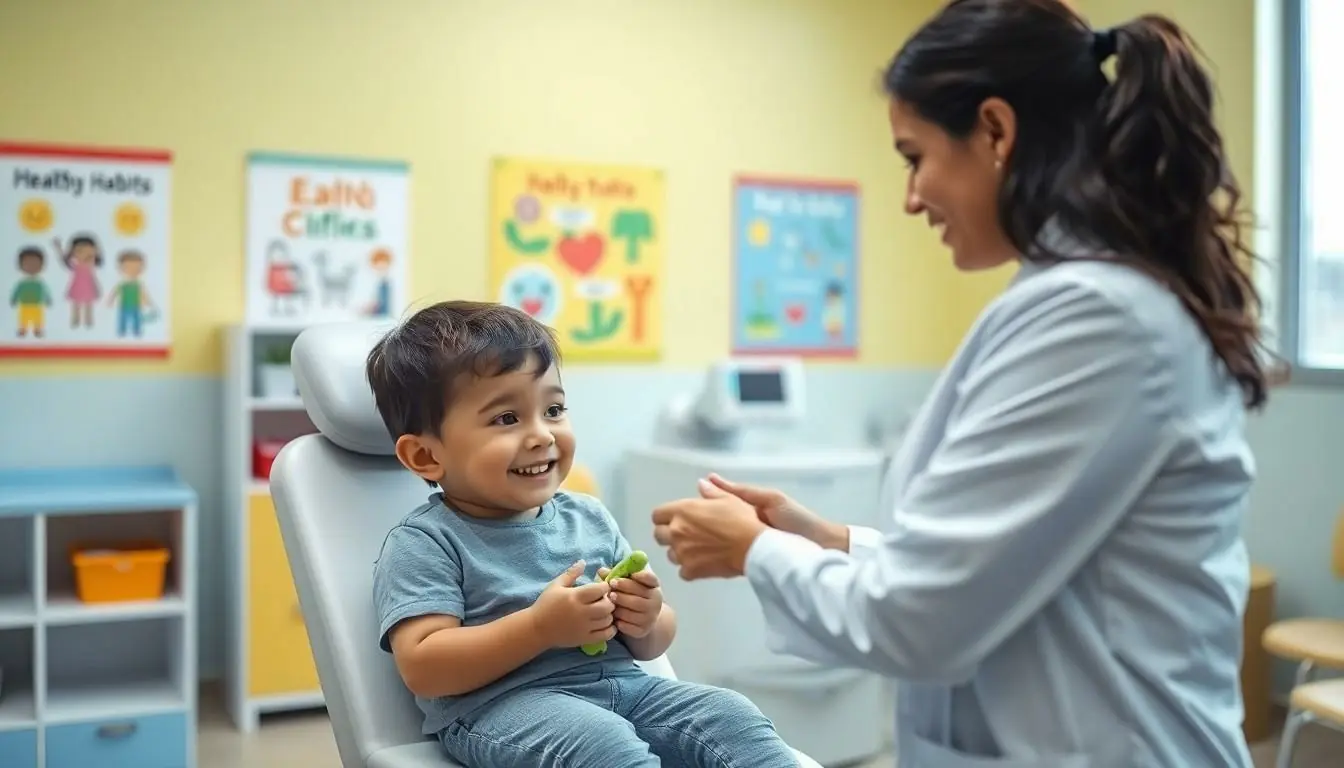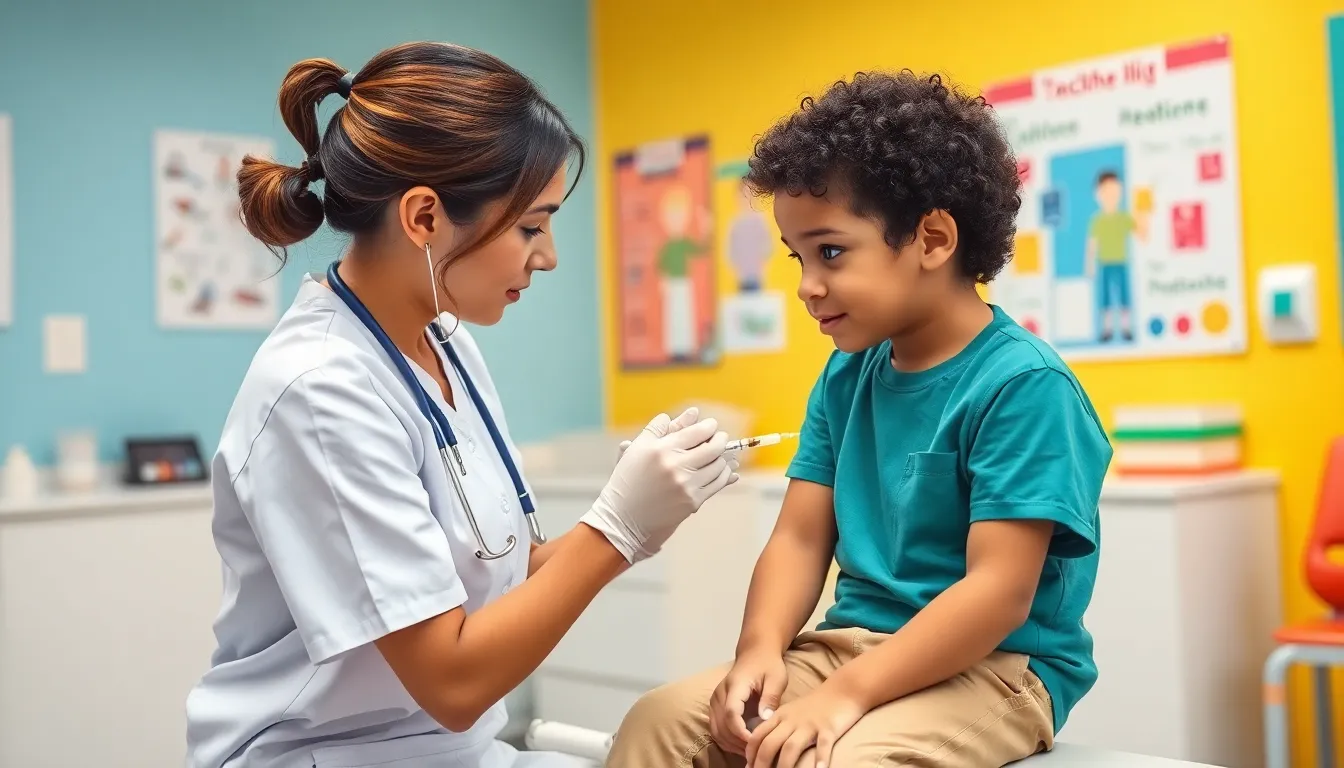Navigating the world of kids and teens pediatrics can feel like trying to solve a Rubik’s Cube blindfolded. Parents often find themselves juggling everything from tantrums to teenage angst, all while hoping their little ones remain healthy and happy. It’s a wild ride, but it doesn’t have to be a solo journey.
Table of Contents
ToggleOverview of Kids and Teens Pediatrics
Kids and teens pediatrics focuses on the medical care of children from birth through adolescence. This specialized field addresses unique health needs at various developmental stages to promote optimal growth and development. Pediatricians monitor physical, emotional, and social well-being, providing preventive care and treatment for illnesses.
Developmental assessments play a critical role in this field. These evaluations determine if children meet milestones typical for their age. Pediatrics also includes vaccinations to protect against preventable diseases. Immunization schedules provide vital protection during early years and adolescence.
Management of chronic conditions like asthma, diabetes, and obesity is essential in pediatrics. Ongoing monitoring ensures effective treatment plans and lifestyle adjustments. Pediatricians collaborate with families to instill healthy habits and educate regarding disease management.
Mental health increasingly gains attention within pediatric care. Conditions like anxiety, depression, and ADHD require comprehensive evaluation and intervention. Early identification aids in implementing appropriate treatments and support systems.
Additionally, routine check-ups facilitate better health outcomes. Regular visits allow for early detection of potential issues, leading to effective interventions. Pediatricians aim to foster parent understanding of their child’s health and development.
In today’s environment, technology also plays a role in kids and teens pediatrics. Telemedicine offers convenient access to consultations, improving continuity of care. This adaptation meets the needs of busy families while ensuring that timely healthcare remains available.
Importance of Pediatrics in Early Development
Pediatrics plays a critical role in fostering healthy development throughout childhood and adolescence. Early interventions can significantly impact physical and mental well-being.
Physical Health Aspects
Physical health management in pediatrics encompasses growth monitoring, vaccinations, and chronic disease management. Regular check-ups enable healthcare providers to track developmental milestones, providing parents with insights into their child’s progress. Immunizations protect against various infectious diseases, ensuring children remain healthy during formative years. Children often develop chronic conditions like asthma or diabetes, which require specialized care to promote a healthy lifestyle. Active engagement with pediatricians supports early detection of potential health issues, allowing for timely treatment and interventions.
Mental Health Considerations
Focusing on mental health in pediatrics is essential for overall development. Healthcare providers assess emotional and behavioral health, identifying issues like anxiety or ADHD early on. Such conditions, if left unaddressed, can hinder educational and social development. Pediatricians often collaborate with mental health professionals to create comprehensive care plans tailored to each child. Parental involvement enhances treatment success, facilitating open communication about emotions and behaviors at home. Prioritizing mental health fosters resilience, equipping children with coping strategies to manage life’s challenges.
Common Pediatric Conditions
Understanding common pediatric conditions helps parents manage their children’s health effectively. Key concerns include allergies, asthma, obesity, and nutrition.
Allergies and Asthma
Allergic reactions affect many children, often causing symptoms like sneezing, itching, and coughing. Asthma, a chronic respiratory condition, can significantly impact daily activities. Symptoms include wheezing and shortness of breath. Both conditions require proper diagnosis and management from healthcare providers. Regular follow-ups may lead to better control of asthma symptoms. Identifying allergens can minimize exposure and improve quality of life. Parents should work with pediatricians to create individualized action plans for managing asthma and allergies.
Obesity and Nutrition
Childhood obesity poses serious health risks, including diabetes and heart disease. It stems from a combination of poor dietary choices and inactivity. Nutrition plays a critical role in preventing obesity. Offering balanced meals rich in fruits, vegetables, and whole grains encourages healthy eating. Parents can model positive habits by engaging in physical activities as a family. Seeking guidance from healthcare providers ensures effective strategies to address weight concerns. Regular check-ups facilitate monitoring of nutritional needs and growth.
Adolescent Health Issues
Adolescence presents unique health challenges that require targeted attention and care. Both mental and physical health significantly impact overall well-being during these formative years.
Mental Health Challenges
Mental health issues often arise during adolescence. Conditions like anxiety and depression commonly emerge, affecting daily functioning and social interactions. According to the National Institute of Mental Health, approximately 1 in 5 adolescents experience a mental health condition. Early identification proves crucial for effective intervention. Pediatricians play a vital role in monitoring mental health, utilizing routine check-ups to assess emotional health. Parents should feel empowered to discuss concerns openly with healthcare providers. Collaboration between mental health professionals and pediatricians fosters comprehensive care plans, emphasizing early treatment and support.
Sexual and Reproductive Health
Sexual and reproductive health becomes increasingly important during the teenage years. Adolescents require guidance on safe practices and understanding their bodies. The American Academy of Pediatrics recommends discussing topics like consent, contraception, and sexually transmitted infections. Routine health visits can include discussions about puberty and healthy relationships. Access to information helps adolescents make informed decisions. Engaging parents in these conversations can enhance communication and understanding. Comprehensive sexual education strengthens knowledge about risk reduction and promotes responsible behavior among teens. Prioritizing sexual health education leads to healthier outcomes during adolescence and beyond.
Preventive Care and Screenings
Preventive care and screenings play vital roles in pediatric health. Early examinations foster healthy growth and development, enabling healthcare providers to identify potential health issues before they become serious. Routine check-ups are essential for tracking milestones and ensuring children receive necessary vaccinations.
Vaccinations protect against various diseases, including measles and whooping cough. According to the Centers for Disease Control and Prevention, vaccines can prevent outbreaks and reduce healthcare costs. Pediatricians recommend vaccination schedules tailored to individual needs, ensuring optimal protection during developmental stages.
Screening for conditions like obesity, anxiety, and asthma remains crucial during childhood and adolescence. Pediatricians perform regular assessments to monitor BMI and mental health, aiming to identify concerns early. For instance, growth measurements and behavioral evaluations provide valuable insights into children’s overall well-being.
Furthermore, sexual and reproductive health discussions are necessary during routine visits for adolescents. Addressing topics like consent and contraception encourages informed decision-making. Open communication between healthcare providers and teenagers supports healthy relationships and responsible choices.
Parental involvement enhances the effectiveness of screenings and preventive care. Actively participating in discussions about children’s health fosters understanding and encourages healthy habits at home. Engaging families in a collaborative approach leads to better health outcomes and establishes lifelong wellness practices.
Ultimately, emphasizing preventive care ensures children and teens are healthier and more resilient. Regular check-ups, screenings, and vaccinations work together to create a comprehensive health management plan. Maintaining an ongoing dialogue about health topics strengthens the bond between pediatricians, parents, and children, supporting their journey toward lasting well-being.
Conclusion
Navigating the health and well-being of kids and teens can be daunting for parents. With the right support and knowledge parents can effectively tackle these challenges. Prioritizing both physical and mental health through routine check-ups and open communication fosters a healthier environment for children.
Pediatric care plays a vital role in monitoring growth and addressing developmental needs. By engaging with healthcare providers and staying informed about common health issues parents can ensure their children receive the best possible care. Emphasizing preventive measures and early interventions can lead to healthier futures for kids and teens.





